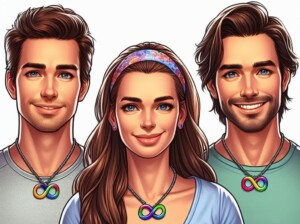Autistic Pride Day is more than just a date on the calendar — it’s a global celebration of neurodiversity, self-acceptance and the unique perspectives and talents of autistic individuals.
We Autists typically have superior skills that can bring tremendous benefits to many kinds of businesses.
Unlike awareness days that often focus on deficits or challenges, Autistic Pride Day is led by autistic people themselves.
It’s a moment to shift the narrative from pity to pride, from misunderstanding to respect.
Many autistic people – actually, probably all – simply cannot imagine themselves any other way.
Autism is an integral part of who and what we are, of our identity, of our very essence and soul.
I swear, when I cross over to the Other Side and meet the Creator, I’m going to be full-on autistic!
Autism Stereotypes
For many who aren’t familiar with autism beyond what they see in movies or brief news segments, it’s easy to fall into stereotypes.
They might imagine someone who’s nonverbal and “trapped” in their mind or, on the other extreme, a “genius savant.”
Though giftedness in more than one area frequently comes with low-support-needs autism (Level 1 ASD), giftedness doesn’t mean savant ability – such as needing only moments to calculate in one’s head the product of two four-digit numbers or the day that a random date 10 years ago fell on.
Another example is that of hearing a complex piano piece for the very first time, then – without any piano lessons – playing the music beautifully note for note.
While savant experiences do exist – and, uncommonly among autistic people at that, autism is a spectrum — it includes a wide range of behaviors, communication styles and ways of processing the world.
No two autistic people are alike, just as no two typical people are alike.
To make this a little easier to understand, think of how dissimilar Sheldon Cooper (“Big Bang Theory”) and Temperance Brennan (“Bones”) are – yet both these fictitious TV characters scream autism, thanks to their coding by script writers.
Autism Isn’t Multiple Sclerosis
Autism is not a disease to be cured. There are no drugs that are formulated to switch off common autistic traits.
ASD is a different way of thinking, sensing and being.
Autistic people may struggle with things that neurotypical people take for granted, like holding eye contact or understanding social cues.
But they also often excel in areas like pattern recognition, deep focus and original thinking.
On the flipside, many Autists don’t struggle with things that trouble many neurotypicals.
For example, during COVID-19 lockdown, an autistic person who was required to do workplace computer tasks from home might have relished this sudden isolation and quietness.
Whereas, an NT may have become depressed or overcome with loneliness spending all day in an “empty” house conducting full-time tasks that had previously been done in a bustling, highly social environment.
Another advantage to having autistic wiring is that we are far less vulnerable to peer pressure than are neurotypical people.
The world needs autistic minds — these honest, straightforward minds that don’t thrive on loads of BS.
Autistic Pride Day: Why?
Autistic Pride Day, which is on June 18, is a chance to celebrate these differences rather than treat them as flaws.
The neurodiversity movement, which supports this celebration, promotes the idea that neurological differences like autism, ADHD, dyslexia and others are natural variations of the human brain — not problems to be fixed or maladies caused by pollution, vaccines or food dyes.
This day also calls out the importance of listening to autistic voices.
Too often, decisions about autism — whether in education, therapy or media — are made without consulting those who actually live it.
Autistic Pride Day flips that script. It says: listen to us, learn from us, value our experiences.
For those unfamiliar with autism, this is a perfect time to open your mind.
Don’t rely on outdated assumptions or pity-driven portrayals.
Instead, read blogs by autistic writers, watch videos created by autistic creators and engage in conversations where the goal isn’t to “fix” someone, but to understand and connect.
Celebrating Autistic Pride Day is not about pretending everything is easy.
Life can be challenging for autistic individuals, especially in a world that doesn’t always accommodate their needs.
These challenges come with significant variation from one Autist to the next.
For example, I’m one force to be reckoned with in the business world when things don’t go according to plan.
I’m fierce and rigorously seek efficiency and professional service.
I’ve been living independently since age 22 and have never needed support services such as for shopping, cooking, time management or money management.
But Holy Moly, I have outright bombed in the relationship department. To this day, I still don’t know how to make a friend. I have no friends – not even autistic ones.
I’ve never been married and never will be.
I strongly believe that my Autistry plays into these life results – and I’m well into middle age.
I have a few other issues as well that have impaired the quality of my life, namely an extreme proneness to overthinking.
Excessive overthinking is a common trait in Autistics with minimal support needs. And the extent to which it occurs can be wicked.
Pride in autistic self-advocacy doesn’t mean perfection — it means dignity.
It means standing up and saying, “This is who I am, and I’m not broken; I’m not defective; I don’t have a processing error.”
In a society that prizes conformity, Autistic Pride Day is a bold reminder that difference is not only valuable, it’s beautiful.
So let’s celebrate the Spectrum, embrace neurodiversity and work toward a future where every brain has a place to shine.










































